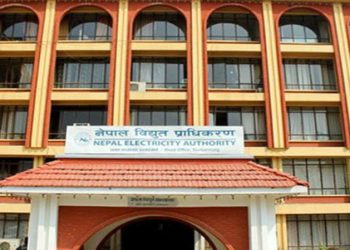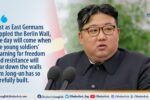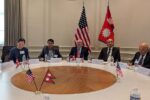In recent days, there have been repeated calls for a change in the electoral system. A prominent example is Sher Bahadur Deuba’s call for the abolition of the proportional representation (PR) system in the House of Representatives elections.
Constitutional demands
As a reminder, during Jana Andolan II, the demand for adequate inclusion of all social groups of the multi-ethnic state was among the prominent demands of the demonstrators on the streets.
In order to achieve such, the proportional electoral system was introduced by the Interim Constitution of 2007 and applied for the first time in the elections to the first Constituent Assembly in 2008.
At that time, all political parties declared their support for this. The Maoist party had finally even called for a purely proportional electoral system.
In the end, a two-tier system remained: 60 percent of the MPs were elected through the PR system, the rest through the direct election system (FPTP).
The PR system was intended to guarantee political participation in parliament for the various social groups according to their respective share of the population.
This would have been rational if the rules on the PR system had also been applied to the selection of FPTP candidates, as stipulated in Article 63 of the interim constitution.
Unfortunately, none of the parties complied with this. Rather, even then they used the direct election system to ensure the continuation of the dominance of males from the Khas Arya circle.
Despite these shortcomings, the drafting of the various aspects of the new constitution went quite well until early 2010.
It was only when the traditional male elite at the top of the political parties realized that their existing privileges could be dismantled that they took the reins into their own hands.
The Constituent Assembly degenerated into an instrument of endless power struggles. When the top politicians finally got their act together after the earthquakes of 2015, the members of parliament were only allowed to approve what the party bosses had decided on as a new constitution.
Strikingly, the new constitution reversed the proportion between the PR and FPTP systems in the elections. Today, only 40 percent of MPs are elected through the PR system.
The passage of the transitional constitution on social inclusion in the nomination of direct candidates was deleted altogether. This allowed the political parties to manipulate the composition of the parliamentary level unhindered in their own interests.
The reality in today’s HoR
To illustrate this, let us take a look at the election results of 2022: 58 percent of the directly elected MPs are Khas Arya, with the exception of four persons all males. Yet male Khas Arya does not even makeup 15 percent of the total population.
Since a further 31.8 percent of the 110 mandates to be allocated went to Khas Arya through the PR system, the share of Khas Arya in the HoR is now 47.3 percent.
Only one Dalit was directly elected (population shares 13.8 percent, almost as many as male Khas Arya) and no Muslim (population shares 4.4 percent). [1] Of the 165 directly elected MPs, only nine are women.
In order to make the Khas Arya appear as the numerically dominant group, the Tharu were removed from the Janajati group as a separate ethnic group under the new constitution.
Yet the Tharu see themselves as Janajati and are among the oldest affiliates of the Nepal Janajati Mahasangh, now the Adivasi Janajati Mahasangh.
Including the Tharu, the Janajati have four percent more members than the Khas Arya, which not only dominate politics.
So what does Deuba want to achieve with his current proposal? Allegedly, he wants to improve the parliament’s ability to act by means of a pure direct election system.
People’s awareness and level of education have grown enormously. Many no longer want to be fobbed off with slogans as they were once common under the monarchy and as they have been adopted by many politicians today.
However, he fails to realize that the system of 4-5 political parties, as it existed in the 2017 parliament, is no longer valid today.
In view of electoral alliances, it is difficult to determine the strengths of the parties. If one wants to get some idea, one has to go back to the results of the PR system.
These show that the old established parties are clearly weakening, while new parties have entered into competition.
The hitherto major parties are particularly affected. We see that the CPN (UML) remains the strongest party, just ahead of the NC.
This was similar in 2017, except that both parties lost about 6-7 percent each compared to 2017, and the three major parties altogether, i.e. the main ones responsible for the chaos, lost almost 16 percent.
The CPN (MC) was still able to maintain its position as the third strongest party, which was probably thanks to the electoral alliance, but the decline of this party since the 2008 elections is evident.
At that time, it had won half of all direct mandates and around 30 percent of the PR seats. The CPN (Unified Socialist) is also on the drip of the electoral alliance.
In the PR system, this party has not even crossed the three-percent hurdle and thus has no Parliamentary Group status.
If Deuba now believes that he can ensure more stable majorities in parliament with a pure FPTP system, this seems utopian.
A clear parliamentary majority of a single party has existed in Nepal at best with the first Koirala government of 1991, which, as is well known, was squandered within the party; the short-term NC majority of 1999 was only due to the previous split of the CPN (UML).
From 1994 onwards began the system of endless power struggles that continues to this day. The more parties are represented in parliament, the more difficult it becomes to form coalition governments, as the top politicians of all parties are primarily oriented towards their personal power and privileges.
Never before have they personally participated as ministers in a government led by another top politician. All politicians lack the overriding interest in the concerns and needs of society, the economy, job creation in the country, and nature, to name a few things.
What would definitely fall by the wayside with Deuba’s new proposal would be the recognition of social diversity and the adequate participation of the many groups, a concern that should be very closely linked to the new constitution.
The slight gain in votes, for example, leads the RPP to believe that a return to Hindu monarchy would solve all the country’s problems, but this party, with only 5 percent of the vote, including presumably many protest voters, is still to be considered insignificant.
People’s awareness and level of education have grown enormously. Many no longer want to be fobbed off with slogans as they were once common under the monarchy and as they have been adopted by many politicians today.
If Nepal wants to maintain its social harmony, it cannot do so without adequate and equal inclusion of all groups in society.
However, this is clearly not what the political parties and their leaders want, as can be seen from their one-sided selection of direct election candidates.
The Maoists once contributed to this development with their insurgency and promises. Unfortunately, not much remains of their ideals.
The Maoist leaders today move at a similarly detached level as many of the leaders of other parties. At worst, this can lead to new radical movements; at the very least, people’s dissatisfaction with today’s political leaders is increasing.
The slight gain in votes, for example, leads the RPP to believe that a return to Hindu monarchy would solve all the country’s problems, but this party, with only 5 percent of the vote, including presumably many protest voters, is still to be considered insignificant.
A return to the Hindu state would be counterproductive, as it would once again deny Nepal’s multiethnicity, of which the country should be proud.
(The views expressed in this article are those of the author and do not necessarily reflect the official policy or position of Khabarhub)









Comment